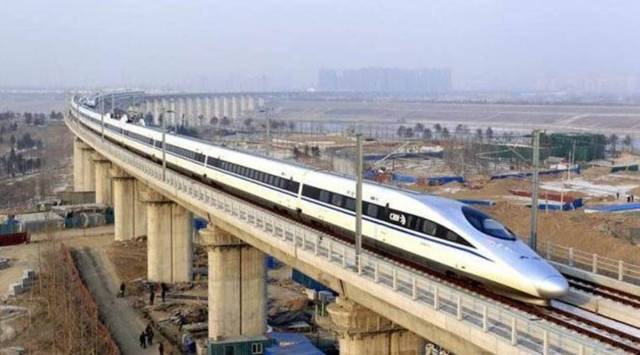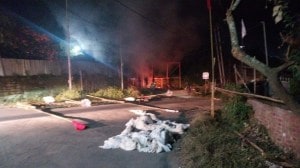One year watch: How infra projects fared under Shinde-Fadnavis govt
With the Eknath Shinde-Devendra Fadnavis government completing one year on Friday, several development projects have received a fillip, and have undergone substantial change in the way they were envisaged.
 The National High Speed Rail Corporation Ltd (NHSRCL) is executing the Mumbai-Ahmedabad High-Speed Rail or Bullet Train Project, a pet project of Prime Minister Narendra Modi. (File photo)
The National High Speed Rail Corporation Ltd (NHSRCL) is executing the Mumbai-Ahmedabad High-Speed Rail or Bullet Train Project, a pet project of Prime Minister Narendra Modi. (File photo) The political tussle between erstwhile Maharashtra Vikas Aghadi government and Bharatiya Janata Party (BJP) led central government had impacted the progress of several infrastructure projects in the state. With the Eknath Shinde-Devendra Fadnavis government completing one year on Friday, several of these projects have received a fillip, and have undergone substantial change in the way they were envisaged. The Indian Express takes a look at projects which have been revived or altered under the present government.
Mumbai Metro 3 corridor & car shed at Aarey
The plan to shift the Metro car shed out of Aarey had become a bone of contention between Uddhav Thackeray led-Sena and BJP, with the former scrapping the proposed car shed and shifting it to Kanjurmarg.
On June 30, the Shinde-Fadnavis duo, in their first cabinet meeting after assuming power, overturned the previous government’s decision of moving the car shed from Aarey. Fadnavis directed the urban development department officials to make a proposal for building the car shed at Aarey, and also started work. Originally, work on Metro 3 line was expected to be completed in 2021, but with the deadline missed, the project cost escalated from Rs 23,136 crore to Rs 37,275 crore, sources said.
As per the initial plan, the first phase of MML-3 between Bandra and Seepz was scheduled to be completed by December 2021, and the second phase from Bandra-Kurla Complex (BKC) to Colaba by June 2022. But after the delays in the project, MMRCL is now planning to complete the first phase by January 2024, and the second after one-and-a-half years, provided the Metro car shed issue was resolved. The project’s second phase from Colaba to BKC is expected to be completed by mid-2025.
Ahmedabad-Mumbai Bullet Train Project
The National High Speed Rail Corporation Ltd (NHSRCL) is executing the Mumbai-Ahmedabad High-Speed Rail or Bullet Train Project, a pet project of Prime Minister Narendra Modi .The first bullet train project of the country was stuck for want of necessary clearances from Uddhav-led Maharashtra government. Opposing the project, then CM Thackeray had said it was of no use to people of Maharashtra, adding that they needed a Mumbai–Nagpur bullet train instead.
Due to non-availability of land, NHSRCL had to cancel tenders it had floated for the station at BKC, due to which work on the project could not start in the state, resulting in delay and a possible cost escalation. However in the past one year, the Shinde-led government expedited all clearances, with handing over BKC land by shifting a petrol pump, and land acquisition was also started by removing hurdles for the project in the state.
The Mumbai Railway infrastructure projects
The Mumbai Rail Vikas Corporation (MRVC), a joint Special Purpose Vehicle (SPV) of Ministry of Railways and Government of Maharashtra undertakes major railway related major infrastructure projects under Mumbai Urban Transport Projects (MUTP).
Established in 1999, costs of the project are shared by the state and Indian Railways at a ratio of 49:51. But during MVA’s tenure, it was struggling to get its share of funds from the state government.
However, since Sena-BJP government was formed, the pending share of the state government was paid to MRVC, and it also issued a GR giving a revised approval to MUTP 3A.
“With clarity on availability of funds and issuance of revised GR by GoM for MUTP 3A, we are working in tandem to push projects under MUTP III & 3A both,” Subhash Chand Gupta, Chairman and Managing Director of Mumbai Railway Vikas Corporation Ltd (MRVC) said recently.
The Dharavi Redevelopment project
Situated at the heart of the financial capital of the country, Dharavi is one of the biggest slums of Asia, where redevelopment projects worth nearly Rs 28,000 crore were planned.
The first tender was awarded to Dubai-based infrastructure firm Seclink Technologies Corporation in January 2019, but it was stalled as the Railways did not hand over the required 46 acres in Matunga.
Former CM Uddhav Thackeray has been accusing the Centre for delaying the much-anticipated Dharavi redevelopment project as the Railway land has not been transferred by the Union government to the state even after Rs 800 crore was paid to the Railways.
In October, the newly formed Maharashtra government led by CM Eknath Shinde and Dy CM Devendra Fadnavis cleared the decks for inviting fresh tenders for the project, which on Tuesday was awarded to Adani Group.
The Oil Refinery Project in Konkan
The Ratnagiri Refinery and Petrochemical Ltd — touted as Asia’s biggest oil refinery — was proposed to be built at coastal Nanar village in Konkan’s Ratnagiri district. It was supposed to be a joint venture between Indian Oil, Bharat Petroleum and Hindustan Petroleum and Saudi Arabia–owned Aramco and United Arab Emirates’ National Oil Company. Purportedly, the project needs an investment of over Rs 3 lakh crore and 15,000 acres.
After the formation of MVA government, CM Thackeray announced that the refinery will not be built in Nanar despite the Centre’s push. Uddhav, in May last year, had suggested a new location and Barsu-Solgaon was identified as the site for the project.
The BJP-Shinde government however has been firm on setting up a refinery in Rajapur tehsil in Konkan. Despite strong opposition from local villagers, the state government had started soil testing at the site. The move did not go down well with villagers who had then staged a sit-in protest at the site, leading police to impose Section 144 at the site. It resulted in clashes between police and villagers after which about 500 villagers, including elderly women, were arrested.
Jalyukta Shivar
CM Eknath Shinde in December gave a green signal to restart the Jalyukta Shivar scheme and directed that financial and human resources be provided to increase the scale of work. The scheme was initiated during 2014-19 when Fadnavis was the CM of Maharashtra. After the Maha Vikas Aghadi (MVA) government came to power, it was halted after allegations of malpractices were made.
Jalyukta Shiwar 2.0 – a pet scheme of Fadnavis –will have two components, a mix of technical and social approach towards water conservation. Jalyukta Shiwar 2.0 will include about 5,000 villages where technical works of water conservation, such as deepening and widening of water bodies, construction of small earthen dams and digging of farm ponds will be done.
These are villages which were not covered during the 2014-2019 phase of the scheme. The other component of the scheme will deal with more than 22,000 villages where water conservation works were carried out in the period between 2014 and 2019. The plan for these villages is to bring water literacy, water management and conservation principles.








